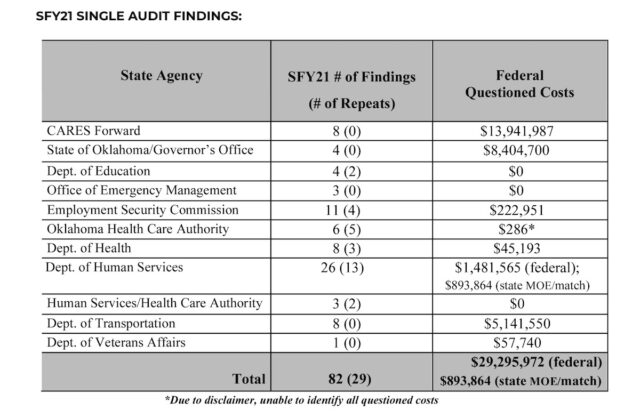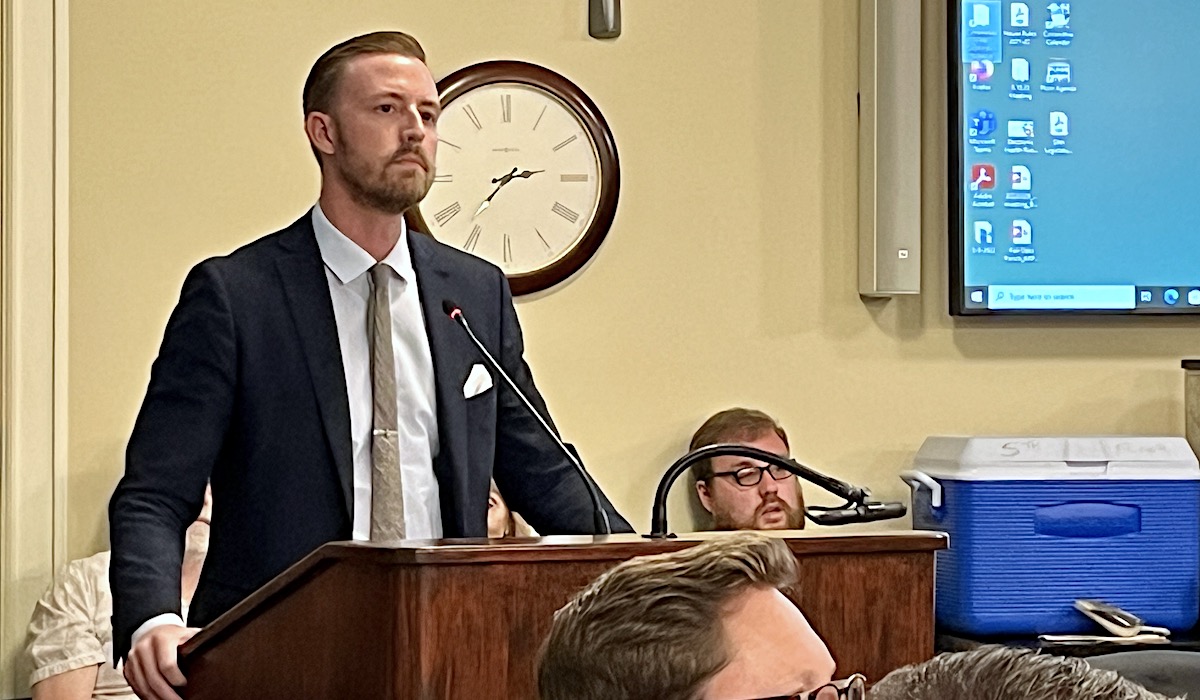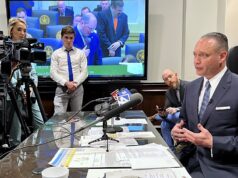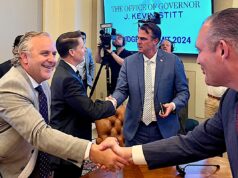
In a scathing 256-page audit that found repeated oversights, errors and the failure to follow basic record-keeping practices, Oklahoma State Auditor and Inspector Cindy Byrd identified more than $29 million in questionable expenditures in Fiscal Year 2021 by state agencies using federal funds aimed at blunting the economic and societal impact of the COVID-19 pandemic.
Many problems highlighted by Byrd involved Oklahoma’s administration of federal CARES Act funds, which Gov. Kevin Stitt branded as CARES Forward. Congress passed the CARES Act in an effort to bolster public services during the pandemic.
The state received $1.2 billion in CARES Act funding, and Byrd identified $13.9 million in questionable expenditures under the CARES Forward designation. She identified another $8.4 million in questioned costs under the Governor’s Office, while the Department of Human Services had $1.4 million. The Department of Transportation had $5.1 million in questioned costs.
All told, 82 instances of questionable costs across state agencies were identified in Byrd’s “federal single audit,” which the State Auditor & Inspector’s Office conducts annually regarding federal funds.
In an interview Tuesday afternoon, Byrd said the state may ultimately have to repay some of the questionably used CARES Act funds because most federal grant programs include strict requirements. If those requirements are not met, the federal government can force states to repay the money.
Byrd’s office released a five-page press release alongside the federal single audit Tuesday, in which the longtime auditor said the state “dropped the ball on compliance and oversight.”
In her interview with NonDoc, Byrd said the problems found in the audit were widespread and followed a common theme.
“You don’t often see the state auditor make a statement so direct where we put out the state of Oklahoma dropped the ball on compliance and oversight,” Byrd said. “What we found was a systemic issue. Regardless of how much Oklahoma spends in federal funds, the basic principles are still there. You have to know what the grant guidelines say. You’ve got to have supporting documentation for where you spend the money, and you have to provide monitoring and oversight, and those basic things that are required for every grant were ignored in some instances. We’ve got to do better.”
House Speaker Charles McCall (R-Atoka) released a statement about the audit.
“After a cursory review of Auditor Byrd’s report, I find her conclusions to be extremely troubling for our state and the hardworking taxpayers of Oklahoma,” he said.
Administrative fees plague rental assistance program
Under the federal CARES Act and American Rescue Plan Act, the state has received about $376 million for the Emergency Rental Assistance Program intended to help people pay their rent or utility bills in an effort to keep them housed.
In her press release, Byrd noted that the audit found $1.6 million in questionable costs associated with ERAP management fees for state Fiscal Year 2021. The questionable costs stem from an unnamed OKC-based foundation‘s decision to charge a management fee in addition to ERAP administrative expenditures. This effectively doubled administrative costs for the program and, in turn, reduced the amount of aid dispersed to landlords on behalf of renters.
Byrd said her office notified the state fairly quickly that these management fees were not permitted under the program’s rules, but she said the state failed to stop the payments. As a result, an additional $8.6 million was improperly retained by the foundation in Fiscal Year 2022, according to Byrd’s release.
“I think that was a really good example of where the state of Oklahoma dropped the ball, and they weren’t watching over these grants to make sure that excessive management costs weren’t charged,” Byrd said in her interview.
Byrd said the guidelines for the program included the usual restrictions for federally funded grants.
“What’s important to note about a sub-recipient is it would be treated the same as if it were passed from the state to a county,” Byrd said. “All of the funds still have to be accounted for properly, and you still have to follow all of the federal grant guidelines, and this grant was very clear about the amount charged for direct and indirect costs.”
Byrd said the rules for administrative and indirect administrative costs changed during the program, but she said that would not account for the questionable expenditures related to ERAP.
“Early on in this grant program, they did not allow for indirect costs. It was only for direct costs,” she said. “But as it progressed, the federal government did come back and change that to allow for indirect costs, but that’s not what we’re talking about here when we questioned the $1.6 million. We’re talking about a flat management fee they took on top of the administrative charge.
“That’s money that could have been given in the rental and assistance.”
GEER funds draw scrutiny of Ryan Walters

Byrd also examined the $39 million spent on two programs in the Governor’s Emergency Education Relief Fund, otherwise known as GEER. The programs, title Bridge the Gap and Stay in School, were intended to assist Oklahoma’s schools and students during the pandemic. In his prior job as director of the school choice-focused nonprofit Every Kid Counts Oklahoma, current Superintendent of Public Instruction Ryan Walters — who was also Stitt’s secretary of education at the time — “directly participated in the administration” of the two programs.
The Bridge the Gap program had $1.8 million in costs that were questioned by Byrd. In the program, 5,000 families received $1,500 each for spending at designated retailers. Aligning with previous reporting from The Frontier, Oklahoma Watch and a federal audit, Byrd’s audit found that nearly 20 percent of the purchases were not spent on learning as specified in the grant. Items purchased included power tools, appliances and furniture. As a result, the federal government has requested the state to pay back $650,000.
The Stay in School program had a budget of $10 million and was intended to help low-income families cover tuition to keep their children in their existing private schools. The program was planned to assist 1,500 families with up to $6,500 per student. However, the audit “uncovered a deliberate operation to give selected private schools and individuals preferential treatment by allowing early access for application submission.”
All told, 65 percent of the expenditures in the program were deemed to be questionable by Byrd.
“As a result, 657 students of low-income families who qualified for the SIS program did not get the financial assistance they requested because the funds were exhausted,” Byrd’s press release summarized. “Of the $6.5 million in question, $1.8 million was paid to private schools in excess of the families’ tuition responsibility.”
Oklahoma Attorney General Gentner Drummond singled out the problems with GEER in a statement.
“The audit report is deeply troubling and illustrates the need for an investigative audit of GEER funds, which I requested shortly after taking office,” he said. “A number of concerning items from the audit will require further investigation. I refuse to tolerate what amounts to a pervasive culture of waste, mismanagement, and apparent fraud.”
For GEER, personal information given to outside groups
The problems found in the FY 2021 federal single audit’s finding about the GEER money went beyond questionable usage of funds. According to the audit, special interest groups requested that grant applications be customized to include two questions asking whether a student had a disability or an individualized education program (IEP). Families were required to provide their child’s personal information, which was never a requirement for the grant. The audit found the state did not take steps to safeguard students’ information.
“It didn’t matter if a child had a disability or IEP. They were not granted an award based on that. They weren’t moved up the line it was on a first come first basis,” Byrd said in an interview. “That was information that was put on an application, and they were forced to answer those questions, and then we found where that information was shared with outside parties. In fact, one email even mentioned they were bringing in an outside data scientist to review the information collected from the program, which we believe is a clear violation of FERPA.”
Byrd said it was unclear why the information about disability or IEP status was requested, but that it might be something explored in the investigative audit requested by Drummond.
A spokesman for the State Department of Education provided a comment to Nolan Clay of The Oklahoman.
“As we already know — and according to the audit — a negligent, out-of-state vendor should do the right things and work with the federal government to recover any misused funds,” the statement read.
Read the full audit report here
